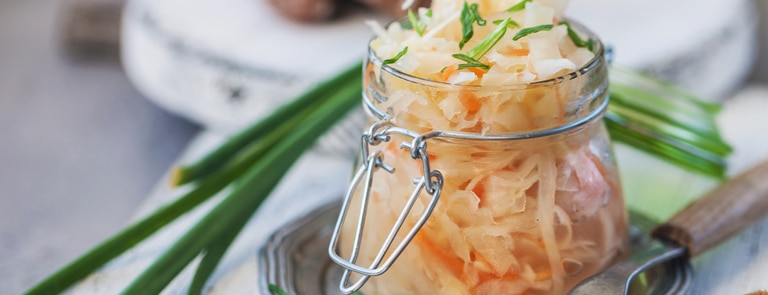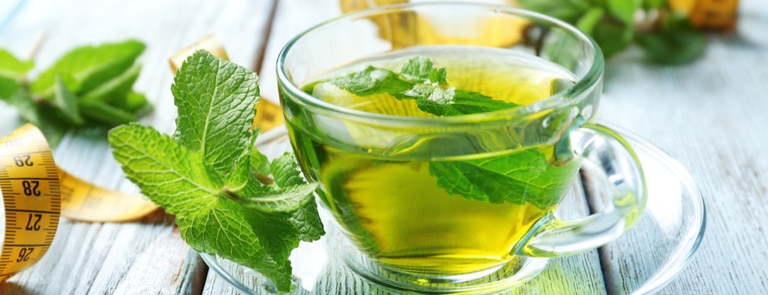15% off £25 or 20% off £35
Sauerkraut benefits

If you’ve been to Germany before, you’ll likely have spotted sauerkraut on many menus. The fermented delicacy is not just a tasty treat to pair with other dishes, but it’s also a bit of an underdog in the health food world.
What is sauerkraut?
Sauerkraut is a dish commonly eaten in Germany since the 17th century, although it’s thought initially to have come from China.
Put simply, sauerkraut is cabbage leaves which have been left to ferment. They’re often seasoned with salt, pepper, and caraway seeds before fermentation to add flavour. Unlike pickled cabbage with a vinegary taste, sauerkraut is much milder and more comfortable to eat on its own or with meat, fish, or veggies.2
Sauerkraut benefits
Fermented cabbage leaves may seem like a strange thing to eat; however, sauerkraut is actually considered by many to be a form of superfood. That’s mostly down to the fermentation process it goes through which provides the cabbage with numerous additional health benefits, including:
-
Probiotics
Fermented foods are well-known for being a good source of probiotics. These are brilliant for digestive health, to support good bacteria.3
Having a healthy gut isn’t just crucial for digestion, it can also help support your immune system and your brain health.4
-
Enzymes
In addition to probiotics, sauerkraut contains enzymes which are used by the gut to help breakdown food into smaller pieces.5
-
Low calories yet high fibre
Sauerkraut is great to eat if you’re trying to lose or maintain a healthy weight. That’s because it’s low in calories and high in fibre. Fibre is also great for digestion, plus it allows you to feel fuller for longer.6
As well as having many benefits linked to its fermentation process, sauerkraut’s nutrition profile is very promising. It’s a good source of vitamin C, plus contains manganese, copper, and folate.7 Cabbage also contains antioxidants – compounds which protect the cells from harmful free radicals.8
How to include more sauerkraut in your diet
If you like the sound of eating more of this gut-supporting delicacy, here’s how9:
- Enjoy it as a side dish with meat, fish, or vegetables
- Add some chopped chilli and coriander to it to make a tasty salsa
- Dollop a spoon on to scrambled eggs or avocado toast for breakfast
- Use some in a sandwich or toastie
- Blend some with soft cheese and seasoning to produce a dip
- Toss some on top of a salad
You’ll be able to pick up sauerkraut in many shops. To make the most of its brilliant benefits, make sure you pick one unpasteurised and free from added sugar or preservatives.10
There’s also the option of making your own at home by layering shredded, salted cabbage with caraway seeds and peppercorns in a container. Cover and leave it in a dark, cool room for two to six weeks.11
Discover jars of ready-made, organic sauerkraut in our cooking range.
Last updated: 8 April 2021
- https://germanfoods.org/german-food-facts/sauerkraut-superfood/
- https://www.bbcgoodfood.com/howto/guide/health-benefits-sauerkraut
- https://www.healthline.com/nutrition/benefits-of-sauerkraut#2.-Improves-your-digestion
- https://www.healthline.com/nutrition/benefits-of-sauerkraut#3.-Boosts-your-immune-system
- https://www.bbcgoodfood.com/howto/guide/health-benefits-sauerkraut
- https://www.healthline.com/nutrition/benefits-of-sauerkraut#4.-May-help-you-lose-weight
- https://www.healthline.com/nutrition/benefits-of-sauerkraut#1.-Sauerkraut-is-very-nutritious
- https://www.healthline.com/nutrition/antioxidants-explained
- https://www.fermentedfoodlab.com/20-ways-to-eat-sauerkraut/
- https://www.healthline.com/nutrition/benefits-of-sauerkraut#How-to-shop-for-sauerkraut
- https://www.bbcgoodfood.com/recipes/simple-sauerkraut













